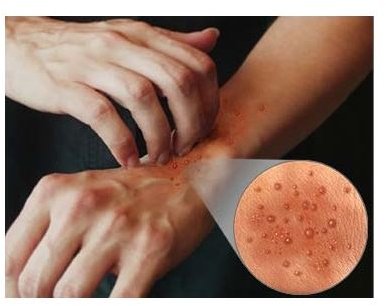Using Natural Remedies for Eczema
Approximately 20 percent of the world population is affected with eczema. It is a type of dermatitis, inflammation of the skin, that can arise from a number of factors. It can occur at any age but is most commonly seen in infants between their second and sixth month, up to two years. Almost half the cases of eczema in infants are resolved by the age of three. Others are subject to recurrences throughout their lives.
Sensitivity to certain foods, infections, skin irritants such as detergents and cosmetics, inhalants such as pollution and pollens, humidity and temperature changes, emotional and physical stress, and some drugs can trigger an outbreak. Symptoms (dry, itchy, red skin) can be brief or they can occur over a long period of time. This condition is not contagious and scarring is rarely a problem. Below are natural remedies for eczema which can help in the treatment and prevention of outbreaks.
Diet
Food Allergies
Identify and eliminate food allergens. In one study, 81 percent of children with eczema had an allergy to milk, eggs and/or peanuts. Other foods, to a lesser extent, include fish, wheat, soy, citrus and chocolate.
Studies report significant protection against this condition (and allergies) from breastfeeding. If a baby who breastfeeds develops eczema, it is usually a result of the mother’s diet.
Omega-3
One study showed a low ratio of omega-3 to omega-6 fatty acids in people with eczema than in people without it. Cold water fish like salmon, flaxseed and walnuts are high in omega-3. Omega-3 fatty acids have been shown to be a more effective remedy for than evening primrose oil which was once thought to be beneficial.
Zinc
Zinc levels, needed for fatty acid metabolism, are also low in people with eczema. During an outbreak, 45-60 mg of zinc per day is recommended for adults. When the condition clears, decrease the dosage to 30 mg a day. It is best to eat foods high in zinc, including almonds, avocado, bananas, brewers yeast, chicken and turkey (dark meat), kidney beans, onions, pumpkin seeds, spinach, wheat germ and yogurt.
Flavonoids
People with eczema release higher amounts of histamine, which causes itching, compared to people without the condition. Flavonoids are natural antihistamines. Extracts from grape seed, bilberry, Ginkgo biloba and green tea are capable of inhibiting allergic mechanisms and may prove helpful as a remedy for eczema.
Topical Treatments
The following natural remedies can be applied to the affected area and will help relieve itching and promote healing:
- a cold compress
- chamomile tea (after it cools)
- a paste made of 1 teaspoon camphor and 1 teaspoon sandalwood
- basil or spearmint leaf juice
- a paste made of brewers yeast and water
- witch hazel
References
Michael Murray, N.D. and Joseph Pizzorno, N.D. “Encyclopedia of Natural Medicine” Prima Publishing 1998
Joan Wilen and Lydia Wilen, Bottom Line’s Healing Remedies (2006)
Image courtesy of the National Library of Medicine (NLM)
Disclaimer
Please read this disclaimer regarding the information contained within this article.
